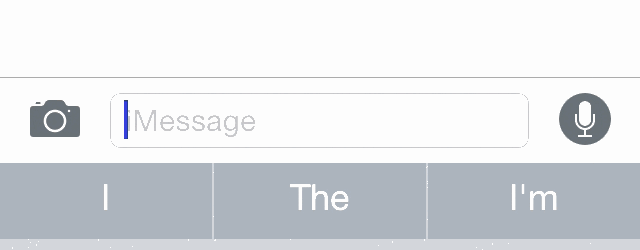Predictive poetry
« previous post | next post »
A few years ago, people noticed that the predictive typing on Android smartphones could construct interesting phrases all on its own: "Your typical sentence", 6/13/2012. iOS 8 has caught up — Geoffrey Fowler and Joanna Stern, "iOS 8 Keyboard Makes Hilarious 'Mad Libs' For You", WSJ 9/17/2014:
Now the latest version of Apple’s iPhone software, iOS 8, adds a layer of smarts on top of autocorrect called QuickType, predictive typing of a sort previously found on Android. Not only does it suggest spelling, it also suggests words you might want to type next. If you keep following its train of robotic thought, QuickType will form entire sentences on your behalf.
The result is so goofy that it is brilliant. For the last week, we—your WSJ personal technology columnists—have been conducting serious tests of the new iPhones and iOS 8, while also holding nonsensical auto-generated conversations with each other.
Here's their sample conversation:
Joanna: My dad just called the police. My mom just called the cops.
Geoff: My phone is so much better than this one.
Joanna: Yeah but you have no idea what I’m saying.
Geoff: Siri and I don’t think that the government has been a good idea.
Joanna: I have a great way of saying the government has ordered a pizza.
Geoff: Yes, you do that for the rest of the day before I go to sleep.
Joanna: What a beautiful thing in my head.
Geoff: Crazy thing I have to do with the help you get.
Joanna: I won this game.
Geoff: Ok so I can see you soon enough.
Joanna: Hackers are the best.
Geoff: Burritos are the best thing about being in love.
Joanna: Coolest person ever.
Geoff: QuickType the best thing about the future.
I suspect that this might have been edited a bit, at least by selection, since even short texts generated by such markovian methods have a high probability of containing ungrammatical sequences. We can see this in many of the tweets @ios8predictive, e.g.
Sometimes I just want to see my friends are so cute I love it when you are the best of all of them were the best way
— iOS8 Poetry (@ios8predictive) September 18, 2014
If you want to be a good day for the next two weeks ago and it was the only one #ios8poetry — iOS8 Poetry (@ios8predictive) September 18, 2014
Chinese and the foods and the I phone and I love it so when and where the hell is this a lot of people who are #ios8 #predictivetext
— iOS8 Poetry (@ios8predictive) September 18, 2014
And similarly in Josh Lowensohn's examples from "I let Apple's QuickType keyboard take over my iPhone", The Verge 9/17/2014, such as this one:

Q. Pheevr said,
September 18, 2014 @ 8:56 am
This could be an amazing time saver. Smartphones can just send messages back and forth to one another with no need for human input at all.
Dan Lufkin said,
September 18, 2014 @ 9:35 am
Mark V. Shaney, call your office.
D-AW said,
September 18, 2014 @ 10:04 am
If this kind of poetry speaks to you, you might try botpoet's "Bot or Not" quiz (http://http://botpoet.com/), which I wrote about (along with other computer and human generated poetry) here:
http://poetry-contingency.uwaterloo.ca/does-steak-love-lettuce-most-human-like-computer-poems-and-vice-versa/
[Youtube also has several entertaining (or tedious, depending on your mood) chatbot conversations, among which: https://www.youtube.com/watch?v=WnzlbyTZsQY%5D
Joyce Melton said,
September 20, 2014 @ 11:32 pm
I wrote a program that did something like this back in the 80s. You fed it a gawdawful load of text then typed in a sentence and it would construct a sentence to answer you. It was a random fractal so the constructed sentences had the structure of real sentences as long as you weren't looking at more than four or five words words at a time.
You could conduct conversations with it and everything you typed went into its library to be sampled and regurgitated to you later.
I called it Alien and fed it long boring pieces of technical writing spiced with excepts from romance novels.
BZ said,
September 22, 2014 @ 9:47 am
I feel so superior. Or not. Here's what my Windows phone is doing when I start with the first word of each of those tweet examples. It seems it's a good day at work. And tomorrow will be as well.
"Sometimes it is a good day at work and the other hand is a good day :)"
"If you want to be a good day at …"
"Chinese food and drink a lot of people who are you doing today and tomorrow is a good day at…"
Yuval said,
September 22, 2014 @ 11:58 pm
My colleague hacked a "word predictor" about three years ago based on Ginger Software's terabyte ngram index (making separate predictions for every 1-8gram input, based solely on PMI statistics). We had oodles of fun with it, from trying to form semantically plausible sentences to finding some very long loops, to finding the most frequent dead-end phrases, after which no further prediction was made (the one I remember is "and baftas"). Given the source of the index (The Internet), one could draft an End User License Agreement almost to the letter based on the top predictions after each entered word.